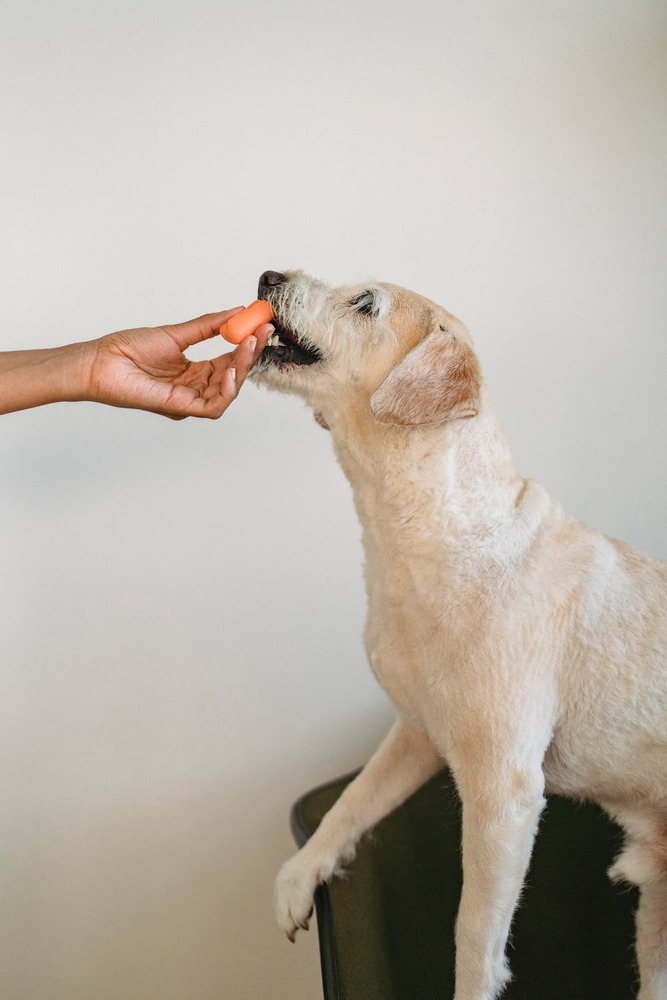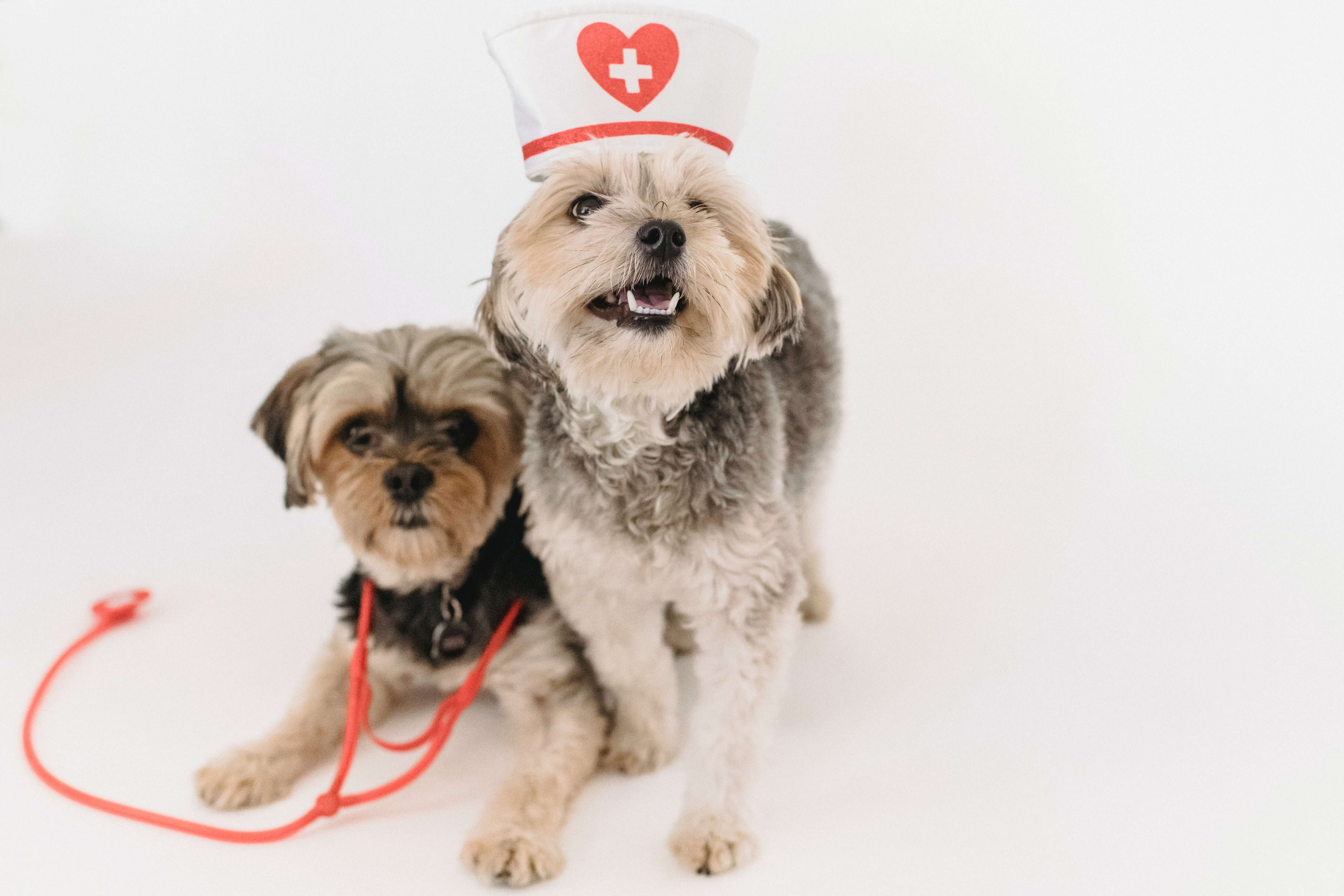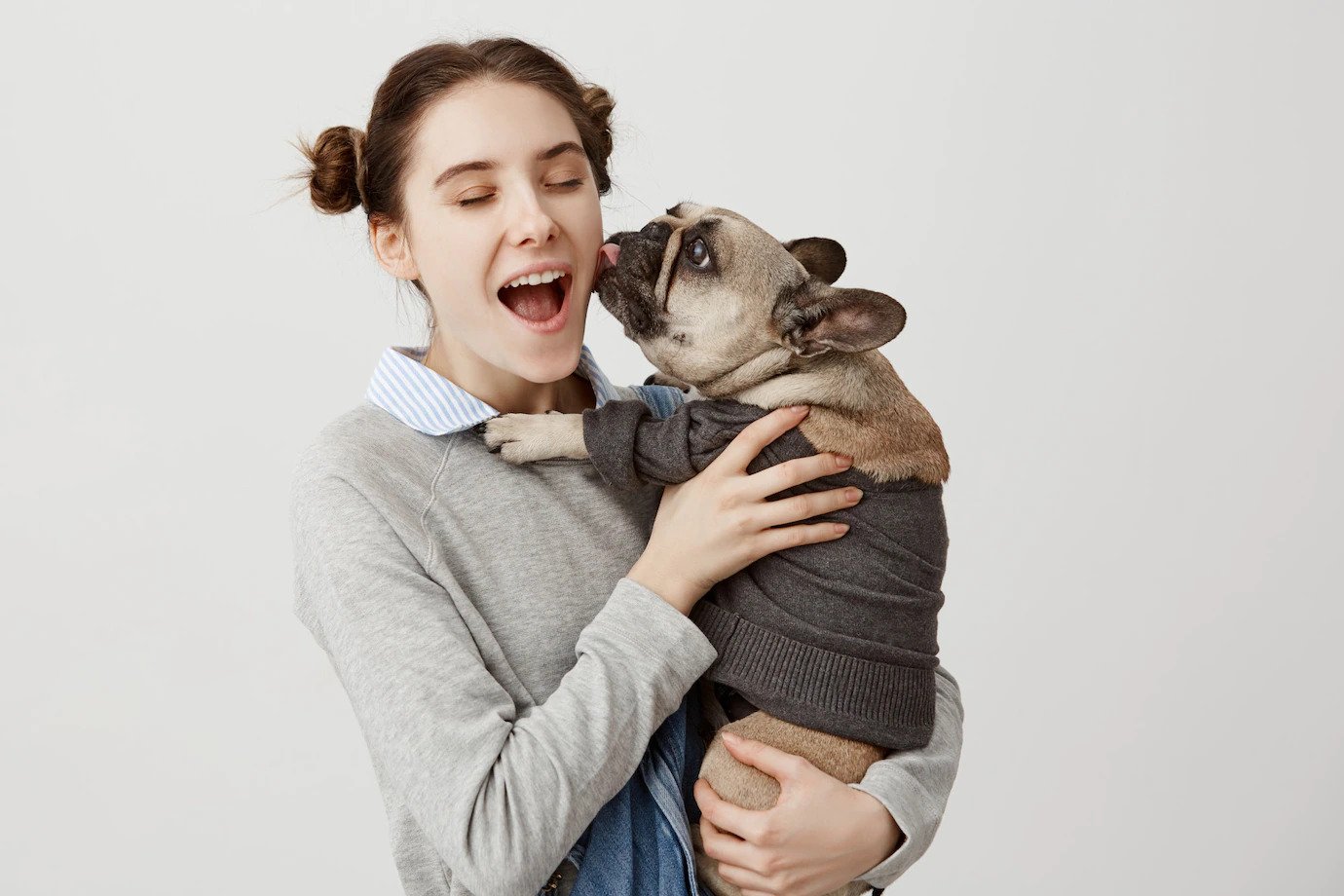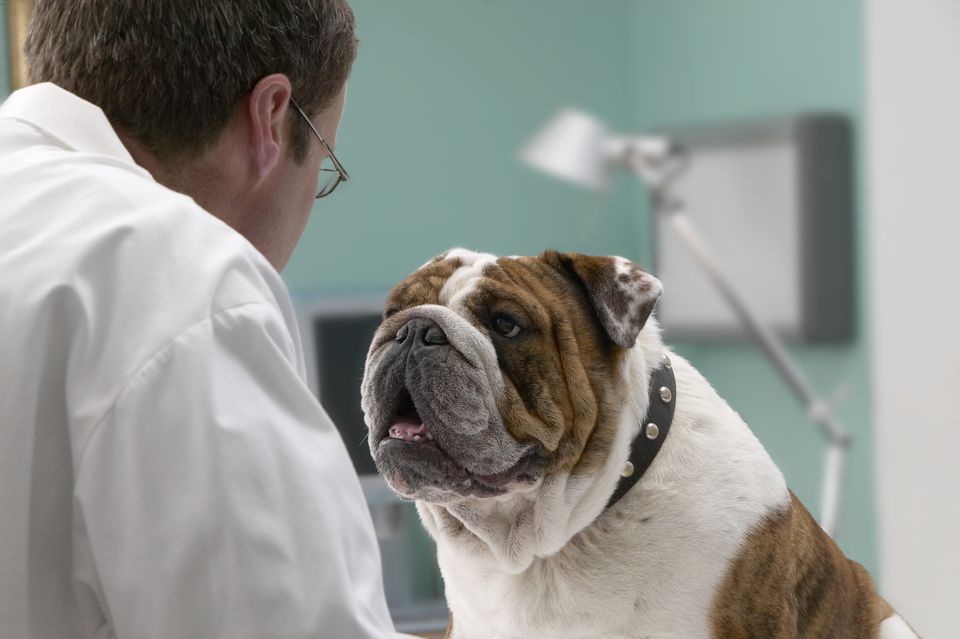
Regardless of the efforts that you make to keep your beloved pet healthy, sometimes unpleasant situations may happen, that you can not avoid. Thoughtful handlers/owners try to regularly supervise their dogs, especially while outside, as they often tend to be greedy and inquisitive. Once walked outdoor, our furry friends immediately start to explore their surroundings and try to eat everything they see. Unfortunately, this habit may lead to many health issues. In most cases our paw friends manage to overcome the problem within a day or two, but in some cases, more dangerous health conditions occur, and we need to consult a veterinarian.
Diarrhea is a common health issue in dogs. In some cases your canine may have one bout of diarrhea or the condition may last up to a day or two. After that he/she keeps acting as usual. If this is the case, your paw friend may have been able to get rid of any unpleasant substances in his/her body themselves. However, this does not mean that you should not supervise your dog and depend on your luck.
If you want to learn more about diarrhea as a health condition in dogs, what may cause it, what are its symptoms, how to handle them and what actions to take to prevent diarrhea, you may want to keep reading.
Types of Diarrhea
There are three types of diarrhea:
-Acute watery diarrhea;
-Acute bloody diarrhea;
-Chronic diarrhea.
Acute watery diarrhea
The first type is related to an “event” that occurs suddenly, and usually, your dog gives clear indications about it. He/she is likely to be tense and anxious and to want to go outside as soon as possible.
Acute bloody diarrhea
The second type of diarrhea may cause worries. Along with the symptoms listed above, it may be a sign of a health condition due to the blood in the stools and the natural response of your canine’s body to this condition. If the second type of diarrhea has occurred, we would recommend that you arrange an appointment with a veterinarian as soon as possible.
Chronic diarrhea
The third type is considered the most dangerous one, especially when it comes to small-sized dogs. The dehydration caused by the loss of liquid due to diarrhea may lead to serious consequences. This type is characterized by a change in the consistency, volume, and frequency of your canine’s excrements for more than three weeks. We would like to advise you not to wait 3 or more weeks for the symptoms to last. The sooner you call a veterinarian, the quicker the problem will be solved.
Diarrhea Symptoms
The most obvious symptoms of diarrhea are frequent bowel movements, that are loose and watery. If your dog looks like he/she is straining to excrete again after he/she already did, it may also be a sign of this condition. Due to the irritation of the digestive system, your furry friend is likely to feel a constant need to relieve him/herself, although there are no solid or liquid waste materials left to eliminate.
Your doggy is also likely to be lethargic, have a high temperature, or lose appetite.

What May Cause Diarrhea?
We will divide the causes of diarrhea into 4 groups:
Food-related causes
The most common cause for diarrhea is that your paw friend has eaten something that irritates his/her stomach. Some dogs are allergic to certain foods and if you tend to have these foods in your home, you should lock them in a safe place, away from your canine.
Intolerance to certain foods and food allergies may lead to digestive problems and even cause IBS (irritable bowel syndrome) or IBD (inflammatory bowel disease). IBS may also be caused by inflammation.
If food gets stuck in your dog’s digestive tract it may cause diarrhea as well.
If you have changed your canine’s diet rapidly and his/her body has not adapted yet, diarrhea may occur. If you decide to change the food of your dog entirely, you need to do it step by step. You may want to add approximately 10% new food to the old one on a daily basis and stick to this plan until the amount of the new food reaches 100%. Otherwise, your dog’s body is likely to react accordingly. Moreover, you need to pay attention to the food ingredients and food quality you provide your dog with. Too many additives and sugar are not only unhealthy for your dog, but his/her body may try to throw them out.
Stress and anxiety
Some dogs are more sensitive than others and overreact to new and/or unpleasant places, people, objects, or too loud noises. They can react too emotionally when left alone at home as well. Separation anxiety is a common issue in dogs that needs to be handled in a timely manner. You need to observe your canine’s behavior in order to recognize the stress triggers. Once identified, the stress triggers should be avoided in the beginning. You can try to expose your canine to them gradually. Always use the proper amount of treats to influence the negative attitude in your dog towards a place/object/person and change it to a positive one.
Intoxication
When eating food that has been poisoned, non-edible objects (the term that describes this condition is known as “pica)” or food unsafe for dogs, diarrhea may occur as a natural response of the canine’s body.
Health-related causes
Unfortunately, diarrhea may be a sign of an underlying health issue like chronic diseases, i.e: issues with the stomach, liver, kidneys, intestinal ulcers, hormonal imbalance or colitis; autoimmune disease; Small Intestinal Bacterial Overgrowth (SIBO) (this condition is characterized by an abnormal increase of the bacterial population in the small intestine); parvovirus; cancer; intestinal parasites; bacterial/ viral infections.
Medication
If you give your dog medication due to certain health issues, you should be aware of any side effects that it may have. Diarrhea may be a side effect of dog medications.
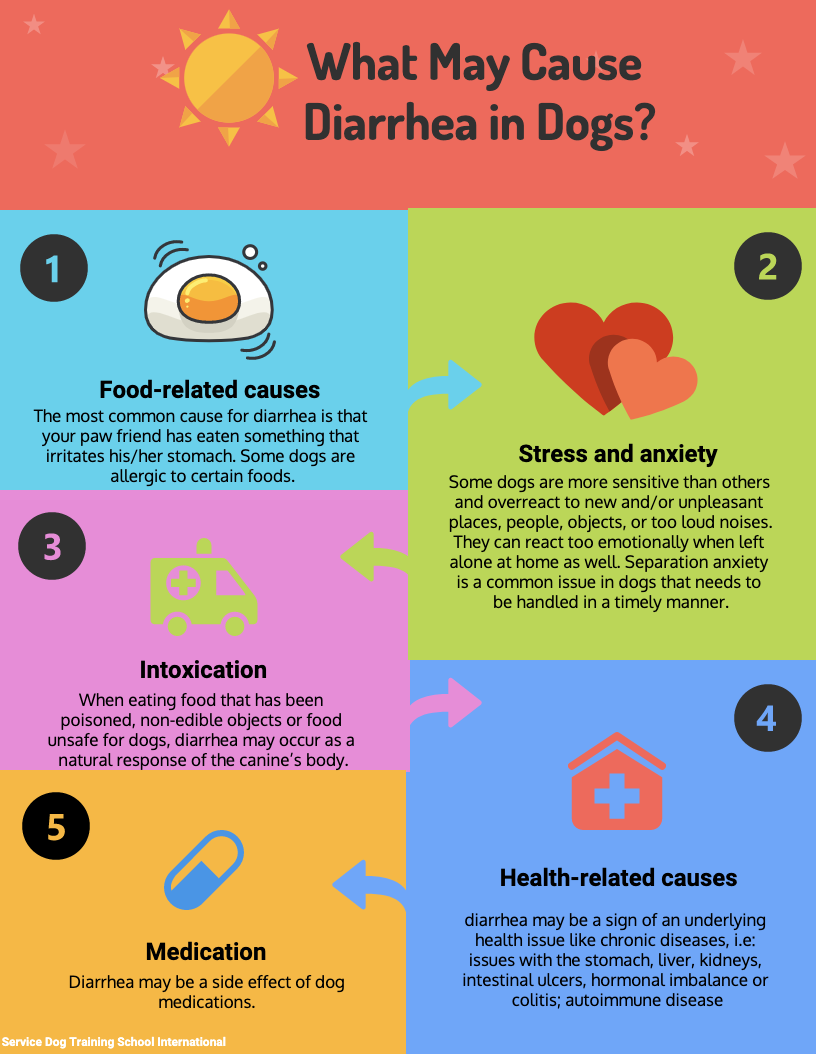
What Can You Do to Help Your Canine Handle Diarrhea?
Please keep in mind that if your dog has not overcome this condition within 24 hours, you should contact a veterinarian, before taking action at your own. You need to be sure, that diarrhea is not a symptom of a more serious health issue that may worsen due to your action.
After your veterinarian confirms, that the cause for diarrhea is food-related and provides you with accurate medical advice, you can contribute to your canine’s health by following a few simple steps.
Fastening
Fast your dog for a maximum of 24 hours. You may fast your dog for a day or a maximum of 24 hours to help him/her throw out all the unhealthy substances. When applying this approach to your routine you need to remember to provide your dog with enough water so that he/she stays hydrated.
Bland diet
After following the first step, your dog may have gotten rid of all bad ingredients. Now you may try to put him/her on a bland diet. A bland diet features food that can be easily digested and improves the digestive system. Furthermore, food included in the bland diet should help your dog normalize his/her bowel movement and have a solid stool again. Bland diet for dogs includes low-fat meat like turkey and chicken and starch like sweet potato and cooked white rice. It s recommended that you boil the meat and steam the vegetables. The lower the fat is, the better the results will be. It is really important that you implement the diet gradually. In the beginning, you can provide 1-2 tablespoons every 3 hours. You are likely to notice that the bowel movement of your canine improves. You can start mixing the food featured in the bland diet with the standard food of your canine. Slowly you can increase the amount of regular food and decrease the bland diet food. 5 days are considered the approximate transition time from a bland diet to a regular diet.
You may wonder why you can not keep your dog on a bland diet for a longer time. The main reason is that the bland diet can not supply all the necessary ingredients to the dog’s body. Food featured in this diet carries some of the nutrients that he/she needs until the condition of the intestinal tract improves. This diet only (without the regular food), is not considered beneficial for the dog in a long term, as deficiency of important nutrients may occur.
Probiotics and healthy bacteria
Since the number of healthy bacteria in the body and the digestive system is being disrupted due to diarrhea, your veterinarian may prescribe proper supplements like culture yogurt and probiotics.
Diarrhea is a health condition that can affect dogs and is considered a relatively common issue. In most cases, dogs overcome this condition quickly, and usually, it is caused by something they have eaten. However, if you notice symptoms of diarrhea that last more than 1-2 days (maximum), you should arrange a veterinarian appointment, even if your dog is acting normal (“normal” is a subjective term and every handler/owner needs to evaluate the behavior of their own dog). Diarrhea may lead to dehydration and serious consequences and maybe a sign of an underlying health issue. Thoughtful owners/handlers always monitor the health condition and behavior of their dogs and are able to take immediate action as needed.
